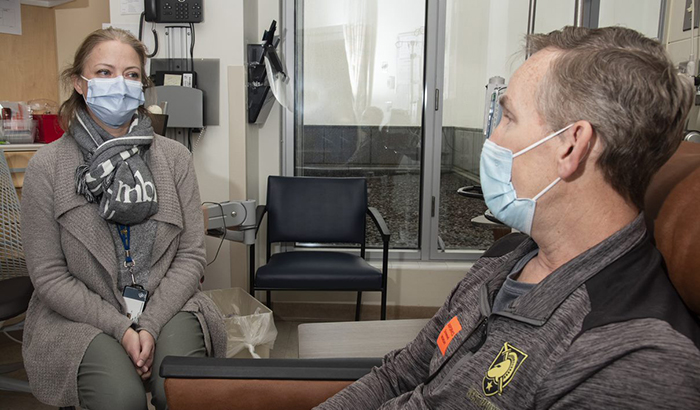Prostate cancer is one of the most common cancers in VA patients. The disease most often affects older men, age 65 and above.
VA has been partnering with the Prostate Cancer Foundation to ramp up the use of precision oncology to treat Veterans with metastatic prostate cancer—disease that has spread from the prostate gland to other areas of the body. Precision oncology involves giving genetic tests to patients and using the results to help guide treatment.
VA Research Currents spoke with two experts to learn more about how Veterans with advanced, or metastatic, prostate cancer can be helped through genetic testing and precision oncology. The answers below were provided by Dr. Julie Graff, an oncologist with the Portland VA Health Care System and Oregon Health and Science University; and Dr. Maren Scheuner, a physician and geneticist at the San Francisco VA Health Care System and the University of California, San Francisco.
VA Research Currents: What is the purpose of genetic testing for men with metastatic prostate cancer?
Genetic testing looks for variations in a person’s genes. Finding gene variations can help with decisions about cancer treatment. Finding gene variations can also help to understand why cancer developed and how best to find cancers early or to prevent them altogether.
What are genes and how do they contribute to cancer?
Humans have about 25,000 genes. Your genes are found inside the cells of your body. Genes are made of DNA. The DNA is a code for a set of instructions that control how your body grows, develops, and maintains itself. DNA changes that are harmful to your health are called mutations. Gene mutations that promote cell growth can lead to cancer. Gene mutations that prevent the repair of DNA mistakes can lead to cancer. Mutations in genes that repair mistakes in DNA, like the BRCA2 gene, are important causes of prostate cancer.
How do gene mutations happen?
Gene mutations can happen for many reasons. For example, exposure to smoking, the sun, radiation, viruses, or certain chemicals can sometimes cause gene mutations. Sometimes gene mutations happen by chance, as cells normally grow and make new cells.
Most gene mutations are acquired throughout your lifetime and can happen in any cell. Therefore, acquired gene mutations are only present in some cells of the body. Fortunately, our cells can fix most acquired gene mutations, but not all. Cancers have many acquired gene mutations.
Some gene mutations are inherited from our parents. Inherited gene mutations usually are found in every cell of the body. Inherited gene mutations cannot be fixed by our cells. Rarely, an inherited gene mutation causes tumors or cancers. Clues to an inherited gene mutation include younger age of cancer diagnosis and family members with the same or related cancers. For example, an inherited BRCA2 gene mutation increases the risk for prostate, breast, ovarian and pancreatic cancers, and melanoma.
What are the possible benefits of genetic testing?
If an acquired or inherited gene mutation is found, you might benefit from new drugs that can increase survival in men with metastatic prostate cancer. For example, PARP inhibitors are used to treat metastatic prostate cancer with acquired or inherited BRCA2 gene mutations. You can also learn about other cancer risks and begin screening for early detection or make lifestyle changes to prevent those cancers. [Editor’s note: Read the story of an Army Veteran with prostate cancer who was helped through genetic testing.]
What are the possible harms of genetic testing?
There are some physical harms possible from a tumor biopsy or a blood draw. There are other possible harms from genetic testing for inherited gene mutations. If you learn that you have an inherited cancer gene mutation, this may increase anxiety or distress or cause some concern about talking with family about your results. Your oncologist may refer you to a genetics specialist to help cope with these types of issues if they come up.
If you would like to know more about genetic testing for yourself or a loved one with prostate cancer, speak with your physician or other health care provider.
More Information
Click here to read the full story.
Click here to learn more about VA research.
Nancy Volkers is a freelance writer supporting the VA Office of Research and Development.
Topics in this story
More Stories
In a new series that highlights advancements in VA health care, VA researchers and clinicians are appearing on a Veteran-themed media platform—Wreaths Across America Radio—to tout their critical work.
Recently published findings from the VA Disrupted Care National Project [...]
Diverse representation of women in health care research allows MVP to make discoveries for women’s health







This is good to know. However, I’m 80 years old and the VA no longer does PSA testing for me. How would I know whether of not I even have prostate cancer?
Att: Charles Riggs
I am in Maine (79) and go to VA Togus and they give me the PSA Test each year with my annual physical. You have to request it from your VA doctor.
The article about gene testing is good to see but the VA are in, I believe, the early stages.
About 5+ years ago I came across the Prostate Cancer Research Institute in Calif if you want to some good info and on going research info check out their website http://www.pcri.org.
Phil Rodgers